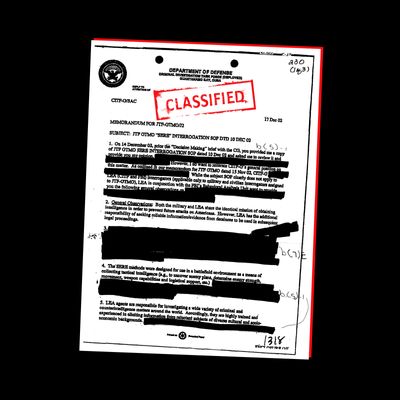
Let’s be clear — handling classified information is a real nuisance. It requires separate hard drives, separate smartphones, even separate rooms for working and having meetings when you are on the road. It also requires having serious compartmentalization skills, so that you remember what information you read in the newspaper — and are thus free to use to impress the Russian foreign minister — and what information was obtained by a foreign intelligence operative risking his or her life, and shared with you through a network whose existence may be secret from many of your own government colleagues.
All this is always going to be challenging for a 70-year-old man with no working history of handling classified material and perhaps some memory issues. The intelligence community tries to make things easier on presidents in several ways, though. Written briefings carry explicit warnings about the level of classification. Oral briefings and cabinet meetings are heavily contextualized. And for most of us, a story about an ongoing anti-terrorism operation — and the prospect of a laptop blowing apart a plane on our watch — would be so vivid and concerning that we’d have no trouble remembering not to share it. Indeed, we might have trouble forgetting it long enough to sleep.
But President Trump, you may remember, has declined most intelligence briefings, while urging that they contain “as little as possible.” When asked about their contents, he has said, “I’ve had a lot of briefings that are very … I don’t want to say ‘scary,’ because I’ll solve the problems.”
It seems as if we’ve had an unbroken decade of scandals about the handling of classified materials. Chelsea Manning, who leaked disks full of information, is back in the news this week. Hacking methods seemingly leaked by an NSA contractor are now suddenly being used in a worldwide wave of cyberattacks. WikiLeaks and Hillary Clinton’s email server were central to the 2016 election.
In Trump’s case it seems likely that he disclosed sensitive information about ISIS out of incompetence. But there’s a precedent for presidents selectively revealing government secrets when it suits them. Our last septuagenarian president, Ronald Reagan, made a great display of giving the nation classified information, related to the existence of a military-grade airfield in Grenada, in the run-up to the 1983 invasion of the Caribbean island.
Presidents are allowed to do this, because they exercise supreme executive power. When Trump had no access to classified information and the power it brings, he was an incessant scold on the importance of strict rules of confidentiality, and punishment for even minor violations of data-handling protocol (the principle that gave us “Lock her up!”). It’s not really surprising that, having discovered the power, both perceived and actual, that flows from government secrets, this president would seek to use that power aggressively — and be more than a little careless in the process.
Already in Reagan’s day, 30 years ago, classified information was a vast sea of data — much of it gossip, administrative details, re-typed newspaper headlines — in which floated bits of genuinely sensitive material. A quick perusal of the WikiLeaks dumps will demonstrate that this is still the case. The 21st-century surge in military and intelligence operations against terrorism have produced a companion surge in classified materials. The internet and the information revolution have made it possible for individuals to carry their classified oceans with them wherever they go.
Advocates of reducing the amount of material classified by the U.S. government like to say that, when everything is a secret, nothing is truly secret — and this is what that looks like.
We can all now settle in for a partisan fight about the seriousness of Trump’s lapse. “Everyone does it,” we’ll hear, and that will be true if you mean the small mistakes spy-and-diplomat Twitter was full of Monday night — the time a former official inadvertently left a storage drawer unlocked or a report draft on a desk. In my case, when I was in my 20s, I left a briefcase full of meeting notes in a Russian government conference room.
But everyone doesn’t make mistakes that send half the national security cabinet out with carefully worded non-denials. Everyone doesn’t make mistakes that — whatever the official assurances might be — substantially complicate our relationship with one of our most important allies.
Ronald Reagan, we now know, began to develop dementia during his time in office. But it’s illuminating to compare his leak about Grenada to Trump’s. Reagan worked with his national security team to cherry-pick intelligence to leak in order to buttress a controversial case for military action. It was a strategic, directed effort and his staff knew about it and, presumably, assented to the plan.
Trump’s defenders like to compare him to Ronald Reagan. In this instance, it’s not a flattering side-by-side for the 45th president.
Heather Hurlburt (@natsecHeather) has held foreign-policy positions in Congress, the White House, and State Department.





























